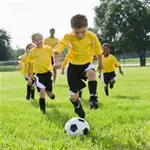
Could taking a break from studying to play pick-up football be beneficial to a student's GPA? Nothing can replace working hard in the classroom, but studies have shown an active body can help boost an active, growing mind.
ACTIVEkids.com spoke to Dr. James Sallis, a professor at the University of California in San Diego, to find out.
Dr. Sallis heads up Active Living Research, which has the goal to "support, share and put into practice research that can promote daily physical activity for children and families across the world."
The Science Behind It
Physical activity doesn't just improve muscles; it improves brain function as well.
"For years we had evidence that physically active and fit children performed better academically. More recently we have learned why," Sallis says. "Physical activity is good for the brain at all ages, including childhood."
"Physical activity stimulates new neurons (brain cells), new connections among neurons, new blood vessels in the brain and better flow of neurotransmitters among brain cells. These improvements in structure throughout the brain lead to better function, such as memory, attention and reasoning."
Healthy Body, Healthy Mind?
Physical activity releases endorphins, which improve mood. Sallis notes that active children have fewer symptoms of anxiety and depression, both of which can lead to higher stress in the classroom.
The skills learned from playing sports or games can transfer to the classroom, too. A fast-paced soccer match requires a child to have quick reflexes and sharp concentration on the ball. In the classroom, that concentration and quick thinking can help a child more easily grasp concepts and work through difficult problems.
Active Living Research even reports that active children are 20 percent more likely to receive an "A" in math or English.
After-School Activities Are Key
Signing kids up for after-school events is a step in the right direction. First, talk to your child about what he or she is passionate about. Joining a school team (football, volleyball) or finding an outside class (ballet, boxing) will not only keep your child active, but provide them with a valuable endorphin boost and help them form a new community. Plus, seeing friends from the team at school and maintaining a sport-eligible GPA can provide extra motivation to keep up in the classroom.
While signing your child up for an active program is beneficial, note that not all programs will fill your child's activity needs for the day, Sallis explains.
"Don't assume that sports, dance, martial arts and other after-school programs alone provide children with enough physical activity, because most do not," Sallis says. "Go observe some programs before signing up and choose a program that is active and has leaders who are positive and encouraging."
Sallis also suggests children wear pedometers to track their activity in after-school programs.
How to Encourage Your Child
"Parents are the gatekeeper for children's activity, so find ways to keep that gate open, with a focus on out-of-school time," Sallis says. "It's easier when children can safely play with friends in the neighborhood and ride their bikes to visit friends, but many parents are uncomfortable letting their kids be 'free range,' even in safe neighborhoods.
"If that is the case, options include parents taking turns supervising group activities in the neighborhood or signing children up for multiple programs so they can be active every day."
 Find activities for kids near you.
Find activities for kids near you.
About the Author










Discuss This Article